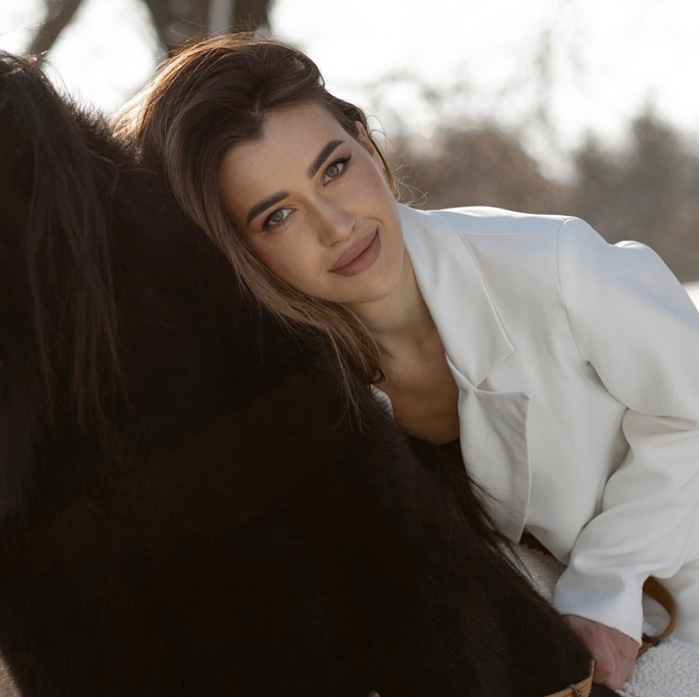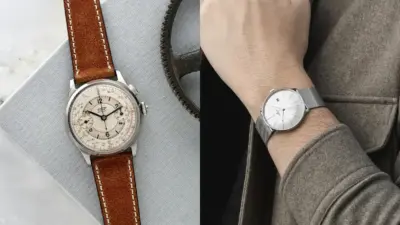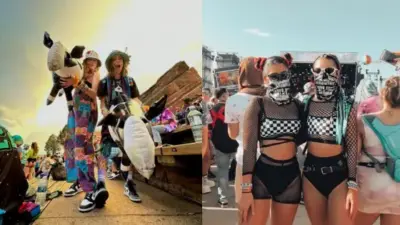Burgundy is a rich, deep color that adds warmth and sophistication to any outfit. When styled with Pantone’s guidelines, it creates looks that are both trendy and timeless. Using Pantone’s specific shades of burgundy helps people choose the perfect tone that suits their style and skin tone.

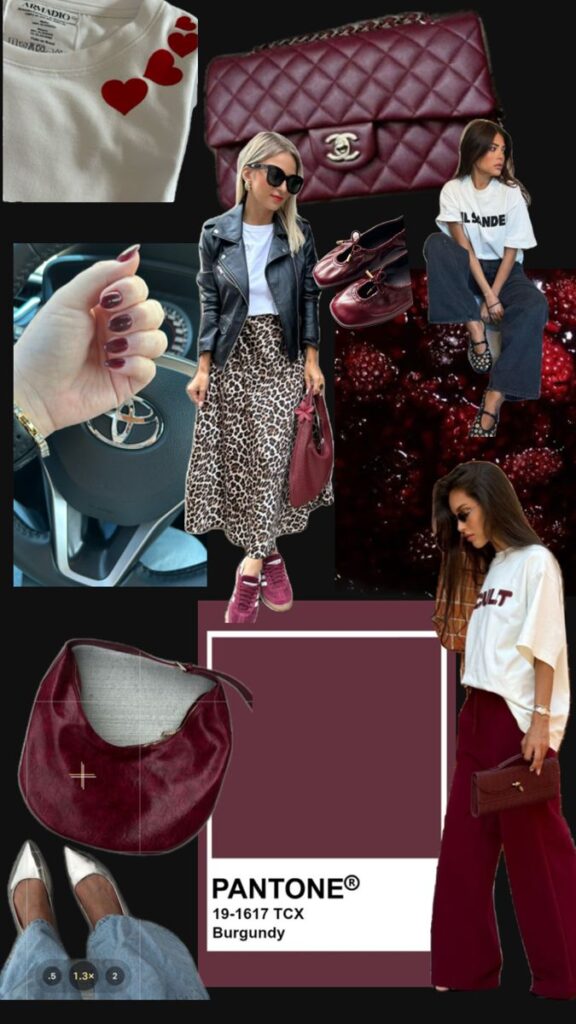
Outfits in burgundy can be simple or bold, depending on how the color is paired. Pantone’s color standards make it easier to mix and match with other colors for a polished appearance. People can find inspiration from the latest fashion trends that highlight burgundy’s versatility.
Burgundy is also easy to accessorize and care for, making it a smart choice for many wardrobe styles. Those who understand how to work with this unique color can create outfits that stand out without being too flashy.
Key Takeaways
- Burgundy shades vary and suit different skin tones.
- Pantone helps create balanced outfit combinations.
- Burgundy outfits are both stylish and easy to maintain.
Understanding the Burgundy Color in Pantone


Burgundy is a deep red tone with hints of purple and brown, often used in design and fashion. The color’s exact shade can vary, which makes identifying and using Pantone’s standardized codes important. Burgundy has a unique place in fashion and color theory, setting it apart from reds and maroons.
Pantone Burgundy Color Codes
Pantone provides exact codes to ensure burgundy’s consistent use across materials. The most recognized burgundy color code is Pantone 19-1617 TCX, often labeled as “Burgundy.”
Other related Pantone codes include:
- Pantone 19-1629 TCX – a darker, more muted burgundy
- Pantone 19-1536 TCX – a brighter, redder burgundy shade
These codes help designers replicate the color precisely in fabrics, paints, and digital designs. Using the correct Pantone number ensures color accuracy and avoids mismatched tones in outfits or products.
Distinguishing Burgundy from Similar Shades


Burgundy is often confused with wine, maroon, or oxblood. It differs mainly in hue and brightness. Burgundy has more purple tones than maroon, which leans more brown.
Here’s a simple comparison:
| Color | Hue | Brightness | Notes |
|---|---|---|---|
| Burgundy | Red + Purple | Medium-Dark | Deep, slightly cool |
| Maroon | Red + Brown | Dark | Warmer, earthier tone |
| Wine | Red + Purple | Medium | Brighter, more vibrant |
Burgundy’s blend of red with a purple undertone makes it distinct and versatile for formal or casual wear.
Burgundy in Fashion History

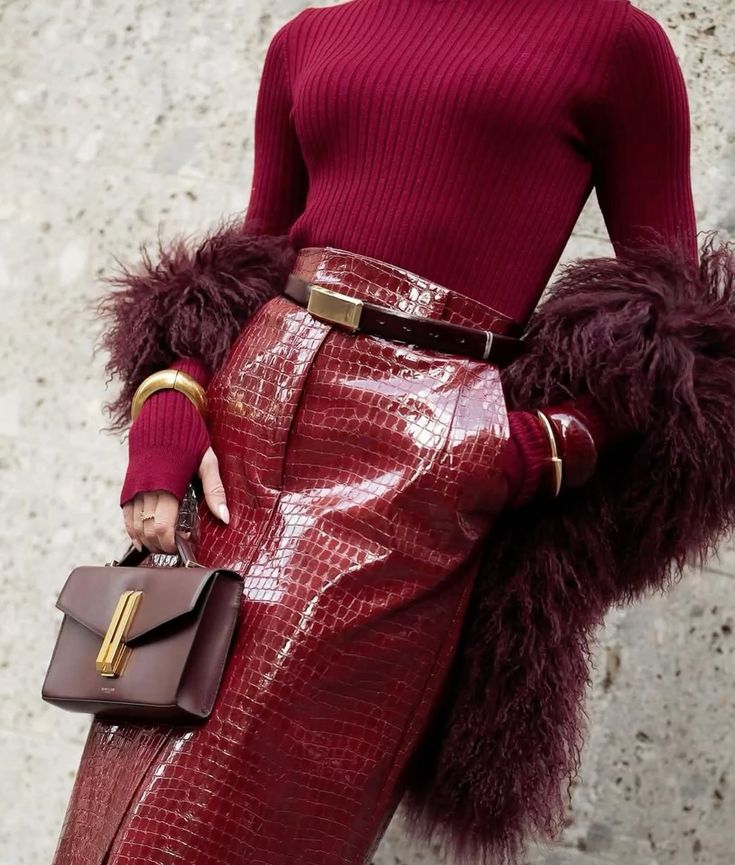
Burgundy has been popular in fashion for centuries, linked to luxury and power. Historically, it was used in royal robes and church garments due to the expensive dyes required.
In the 20th century, it gained popularity in men’s suits and women’s evening gowns, symbolizing sophistication and depth. Designers often choose burgundy for fall and winter collections due to its warm yet muted tone.
The color remains a staple because it pairs well with many neutrals and metallics, adding richness without overwhelming an outfit.
Styling Burgundy Color Outfits for Pantone Lovers

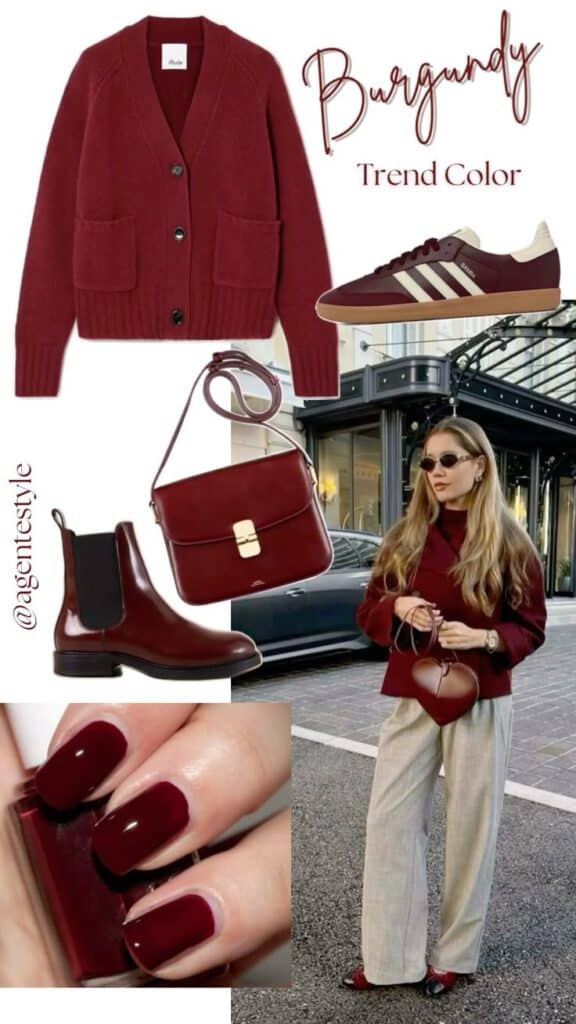
Burgundy is a rich shade that works well in many outfit combinations. It can be worn alone, paired with different Pantone colors, or styled to fit various seasons. Knowing how to balance this deep red helps create eye-catching looks.
Monochrome Burgundy Looks
Wearing burgundy from head to toe creates a bold, uniform style. This approach uses different textures and shades within the burgundy family to add interest. For example, pairing a velvet burgundy jacket with matte burgundy pants keeps the outfit neat but dynamic.
Accessories in lighter or darker burgundy tones help maintain harmony. A burgundy belt or shoes can pull the look together. It’s important to avoid too many contrasting colors here, as the goal is smooth color flow.
Layering is key. A burgundy shirt under a burgundy sweater can work well in cooler weather. This style suits events where a strong, cohesive look is needed but not overwhelming.
Mixing Burgundy With Pantone Accent Colors

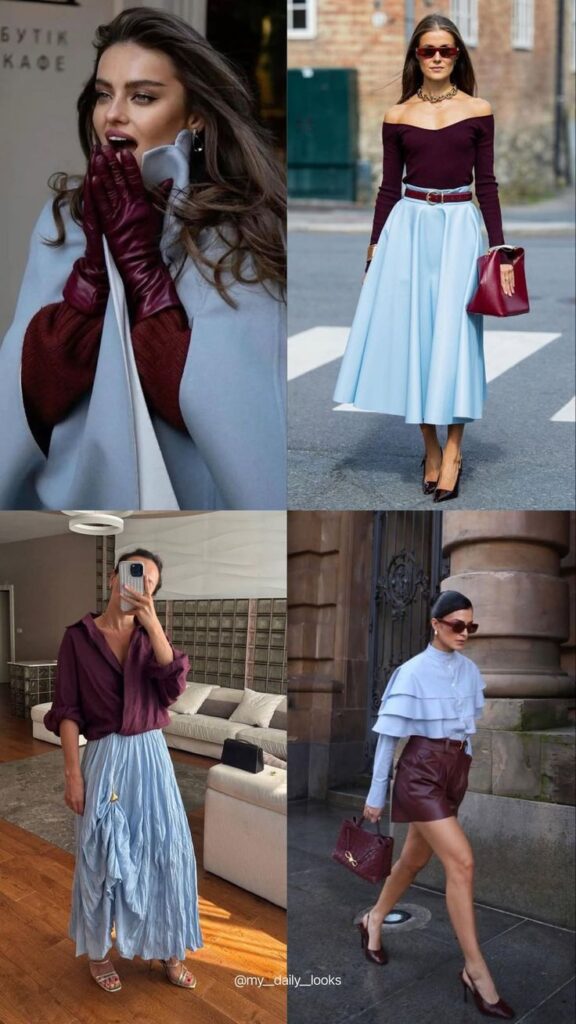
Burgundy pairs well with other Pantone colors, especially neutrals like gray or beige. It also looks great with jewel tones such as emerald green, navy blue, or mustard yellow. These accent colors add contrast and freshness to the outfit.
For example, burgundy pants with a soft gray top make a balanced combination. Adding navy accessories can elevate the look without clashing. Another option is mixing burgundy with blush pink for a softer, more feminine style.
A simple rule is to limit the palette to two or three colors. This prevents the outfit from looking busy. Accent pieces like scarves, bags, or shoes are perfect ways to introduce other Pantone colors.
Seasonal Burgundy Outfit Ideas
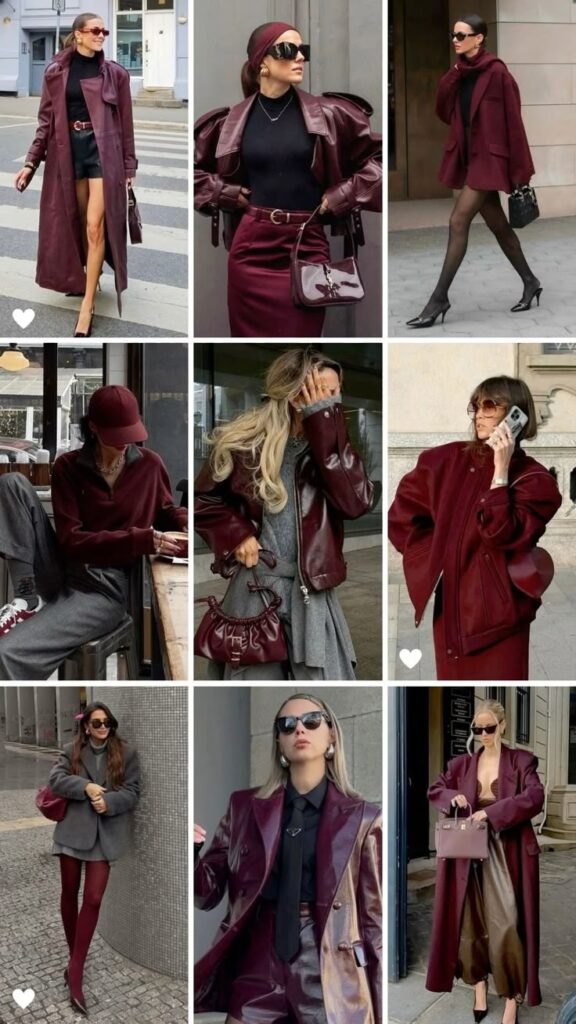
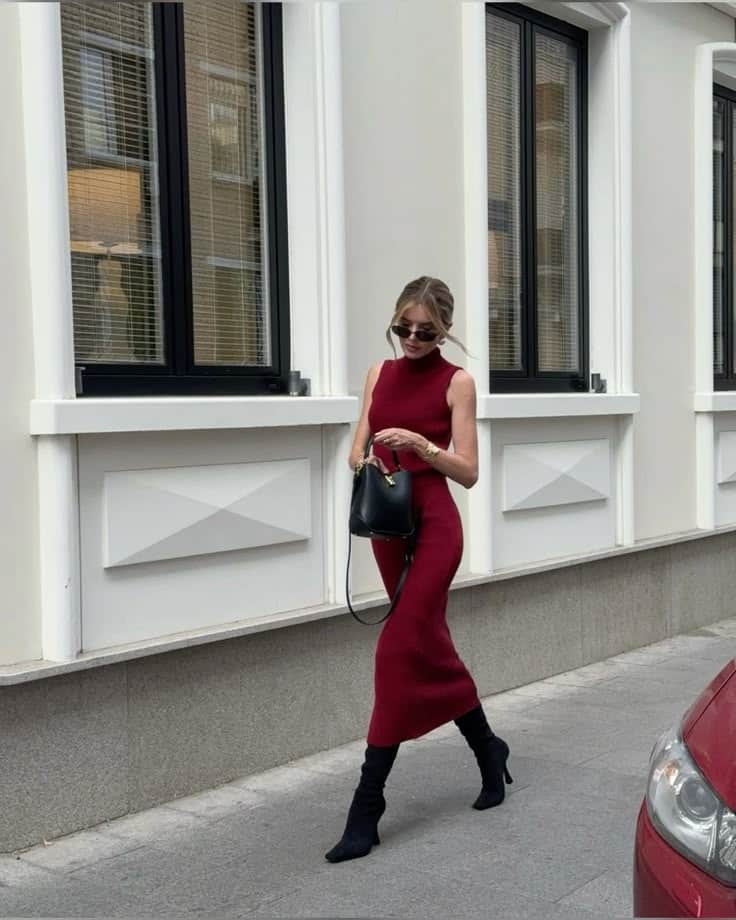
Burgundy works for all seasons if styled right. In fall and winter, it pairs well with warm tones like camel and dark green. Heavier fabrics such as wool or leather in burgundy help keep the look cozy and elegant.
In spring and summer, burgundy can be lighter by choosing thin cotton or linen fabrics. Combine it with soft neutrals or light blue to keep the outfit fresh. A burgundy dress or shirt with white pants fits summer events nicely.
Layering options change by season. In cooler months, add scarves or jackets in complementary colors. In warmer months, keep layers minimal and use burgundy as a single strong color with light accessories.
Choosing the Right Burgundy Shade for Your Skin Tone
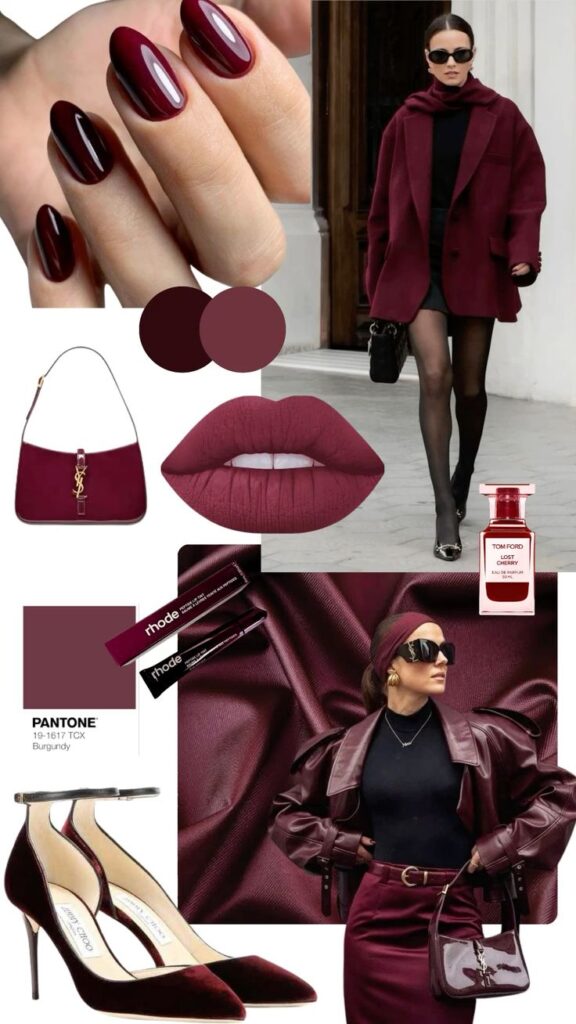

Selecting the right burgundy shade depends on understanding whether warm or cool undertones suit a person’s skin best. The choice affects how the color complements natural features like eyes and hair. It also influences the overall look’s harmony and brightness.
Burgundy for Warm Undertones
People with warm undertones have yellow, peach, or golden hues in their skin. They look best in burgundy shades with brown or reddish-brown tones. These shades add warmth and create a smooth blend with their natural coloring.
Recommended burgundy shades:
- Rusty burgundy
- Brownish burgundy
- Warm wine red
These shades avoid looking too harsh or dull. Wearing warm burgundy enhances skin glow and gives a balanced appearance. Avoid burgundy shades that have blue or purple hints, as these can make warm skin look washed out.
Burgundy for Cool Undertones

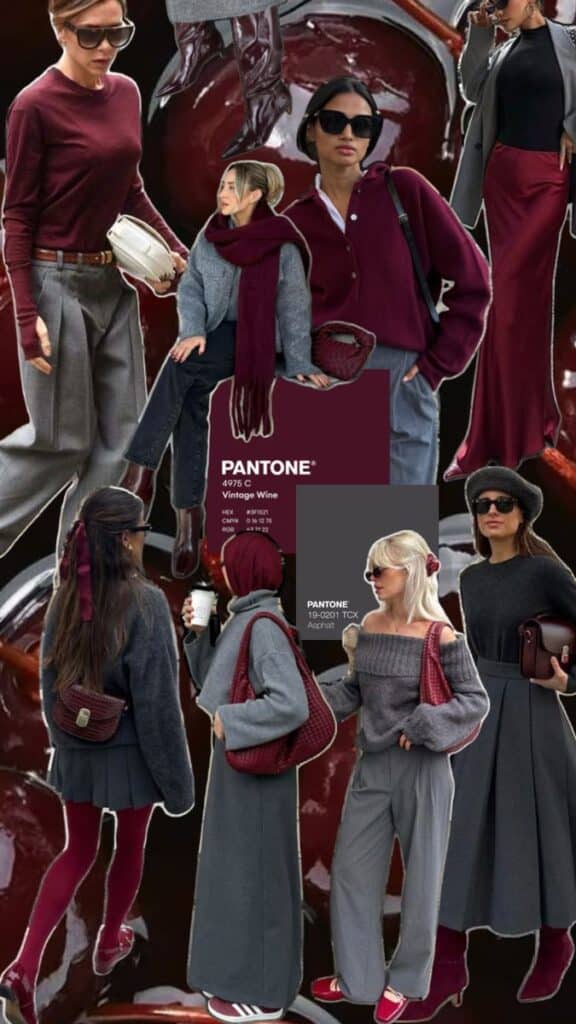
Cool undertones mean the skin has pink, red, or blue hues. Burgundy colors with a cooler base work well for these tones. They often have a bluish or purplish tint.
Recommended burgundy shades:
- Deep purple burgundy
- Blue-red wine
- Cool cranberry
These colors highlight skin brightness and create contrast, making features stand out. It is best to avoid browner burgundies that can clash with cool undertones and dull the overall look. Cool undertones shine brightest in richer, more vibrant burgundy shades.
Pantone-Inspired Burgundy Outfit Combinations

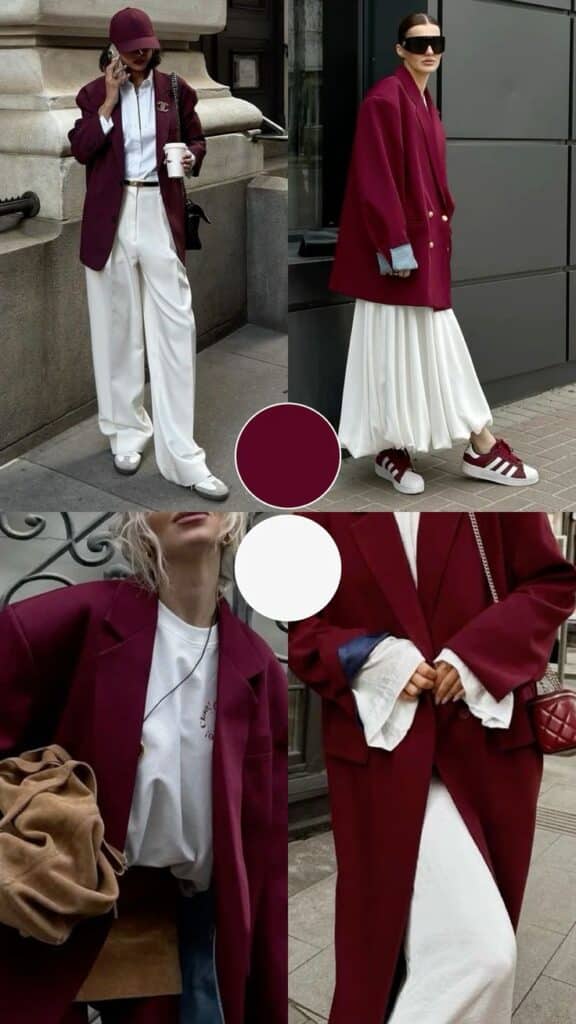
Burgundy outfits work well in many settings, from casual days to professional environments. Choosing the right combinations depends on fabric, fit, and complementary colors.
Casual Daywear Looks
For casual wear, pairing burgundy pants with a light gray or off-white t-shirt creates a balanced, easy outfit. Adding a denim jacket or a neutral cardigan can add texture without overpowering the deep tone.
Footwear should be simple, like white sneakers or tan loafers. Accessories such as a brown leather belt or watch work well to keep the look grounded. Avoid busy prints to keep the burgundy color the focus.
Office-Ready Ensembles
In the office, burgundy trousers or skirts pair nicely with crisp white shirts or soft blush blouses. A navy blazer adds structure and professionalism, while keeping the outfit modern.
Shoes should be polished, like black or dark brown leather oxfords or pumps. Minimal jewelry and structured bags complement the look without distraction. Opt for simple patterns or solid colors to maintain a sharp appearance.
Accessorizing Burgundy Pantone Outfits


Burgundy outfits pair well with accessories that highlight their rich, deep color. Choosing the right jewelry and shoes can either sharpen the look or soften it, depending on the style they want to achieve.
Jewelry and Metallic Accents


Gold and rose gold jewelry work best with burgundy. These warm metals bring out the red tones and add a subtle shine without clashing.
Simple designs like thin bracelets, small hoop earrings, or delicate chains keep the focus on the outfit. Chunky or overly bright pieces can overwhelm the deep color.
Silver can work too, but it should be polished and minimal to avoid looking cold against burgundy’s warmth. Pearls offer a classic touch and can make the outfit look elegant.
Adding a metallic belt or clutch in gold or bronze can also enhance the style without being too loud.
Footwear Choices


Neutral-toned shoes like beige, taupe, and black are safe bets with burgundy. They frame the color without competing for attention.
For a bolder look, dark brown or navy shoes add depth and keep the outfit grounded. These colors match well with burgundy’s warmth.
Avoid bright colors on shoes, as they distract from the outfit’s elegance. Heels, loafers, or ankle boots are great depending on the occasion.
Matte or slightly shiny finishes work well. Glossy shoes might clash with the muted nature of burgundy fabrics.
Burgundy Trends From Pantone Runways


Burgundy has appeared often in recent runway shows, highlighting its rich and versatile tone. Designers use it for both bold and subtle looks, while street styles adapt it for everyday wear. This color blends luxury with approachability.
Designer Collections Featuring Burgundy
Several top designers featured burgundy in their latest collections, showing its range from deep velvet gowns to sharp tailored suits. It appeared in materials like leather, silk, and wool, emphasizing texture alongside color.
Designers like Alberta Ferretti and Tom Ford highlighted burgundy as a key color. They paired it with black and gold accents to create elegant, powerful outfits. Burgundy also showed up in outerwear, including long coats and structured blazers, offering a strong statement piece.
The use of burgundy often leaned towards monochromatic looks or as a standout accent. Its ability to mix with neutral tones like beige and gray made it a favorite on the runway for fall and winter lines.
Street Style Inspiration


Street style shows burgundy’s practicality and style beyond the runway. It is popular in jackets, pants, and accessories like bags and shoes. The color is easy to dress up or down.
Casual burgundy outfits often mix the shade with denim or white shirts. Many people use burgundy to add warmth to their wardrobe without overpowering their look.
Accessories like scarves and hats in burgundy bring subtle color without being too bright. Its use in sneakers and boots is growing, showing its crossover appeal for both formal and casual use.
Care and Maintenance of Burgundy Clothing


Burgundy clothing needs special care to keep its rich color bright. Washing in cold water helps prevent the color from fading. Using a gentle detergent designed for colors is best.
He or she should avoid bleach and harsh chemicals. These can damage the fabric and dull the burgundy shade. Turning garments inside out before washing also helps protect the color.
Drying burgundy clothes in the shade is recommended. Direct sunlight can cause the fabric to lose its deep color. Air drying is often safer than using a dryer.
Ironing should be done on low heat to avoid burning the fabric. Using a cloth between the iron and the garment can prevent shine marks.
Store burgundy clothes in a cool, dark place. This reduces the risk of fading over time. Hanging instead of folding can help avoid wrinkles and keep the fabric smooth.
| Care Tip | Advice |
|---|---|
| Washing temperature | Cold |
| Detergent type | Gentle, color-safe |
| Drying method | Air dry in shade |
| Ironing | Low heat, use a cloth |
| Storage | Cool, dark place, hang if possible |
- 11.7Kshares
- Facebook0
- Pinterest11.7K
- Twitter0
- Reddit0
